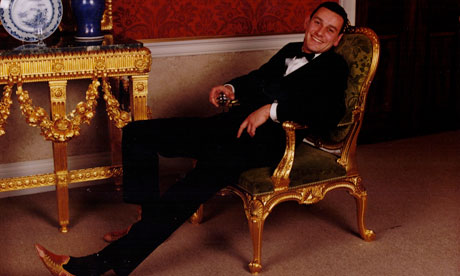
This week, we met Thomas Salme and Adam Wheeler, the former fined for lying about holding a commercial passenger pilot’s licence and the latter for reinventing his academic career.
When I read about men like this, I remember the time I was, in the words of the News of the World, “The Lord of The Lies”. I was the “Credit Card Earl” who apparently funded his “jet-set lifestyle” by spending money on his credit card with no intention of paying the bill.
For this petty crime I was sent to prison for 10 months. I was 23. Made an example of just in case there was some other working class lad who thought he could con his way into the aristocracy.
Wheeler, also 23, was “showered with scholarships” and will be harshly punished; Salme has escaped with a smallish European fine. Yet, even as they wish to punish them, the public’s attitude toward accomplished liars will be tempered by some envy.
Yes, of course, it’s scary that a man with no formal training can fly commercial passenger jets but, really, who gives a damn if Wheeler reinvented his CV so that he might enjoy the delights of a great university? Wouldn’t we all, at some level, like to reinvent ourselves? Public condemnation conceals a private longing for becoming who we always wanted to be.
Come on! Let’s face it, we all tell lies. Some of us just do it rather grandly.
I was 18 when I changed my name. The press loved to describe me as coming “from humble beginnings”. I would describe my childhood differently: born into a complicated family shamed by illegitimacy. I realised that there was a better life, a simpler life to be had by telling a lie. Lying from the earliest age because I simply had no idea what the truth was. My family was riven with lies. My father was in fact my stepfather and the entire family colluded to keep a secret from me, a small boy, by telling lies.
I ran away to Paris, away from the tears and the drama, the secrets and lies. I took the truth by the scruff of the neck and chucked it on to the Rue St Anne. I not only changed my name to Anthony Rendlesham but also appended a delicious title.
Lord Anthony Rendlesham.
Oh, just remembering it now, that moment in Paris after nearly 30 years of not lying about my name causes the hairs on the back of my neck to stand on end. It was so bloody exciting!
When I first lied about my name I expected the lie to vanish after a few hours. In fact, I would tell the same lie for nearly three years. Every time I said my name I buried my sad and ghastly past under the psychic woodpile.
Both the fake pilot and the fraudulent Ivy Leaguer must have known that they would one day get caught. Yet, from my experience that risk fades into the back of one’s mind as the lie grows exponentially. The lie becomes one’s life; the past becomes hard to recognise as one’s own. I often wondered when the ghost of Duncan Roy would come claim me.
For some, pretending is cathartic – a rubbing out of the past one seems to have no control over. I can spot a liar at 50 paces and can tell the truth about others like no one else I know, but the truth about myself was far too excruciating.
Telling the truth is made harder because we live, in the words of Michael Moore, in “lying times”. Honesty has very little currency in modern life – especially in the US where everyone feels that to tinker with the truth is essential if one is going to get on – from the monumental lies politicians tell about weapons of mass destruction and secret torture to the grotesque micro lies we tell ourselves when we allow the plastic surgeon to reinvent our faces.
Both of this week’s imposters worked very hard on their lies: Salme trained all night on a flight simulator; Wheeler became a convincing academic. I was a mere amateur compared with these two. I did not profit from my lie (the credit card was in my own name – I used it right at the end of my adventure, to pay for dinners and shirts).
I simply changed my name and learned how to hold a knife and fork properly. The various aristocratic tribes I infiltrated seemed to accept what I told them as the truth because I sounded right and I was a great deal of fun. They liked having Anthony around.
Of course I didn’t know how (Anthony’s) friends would react to finding that they had a dog in their aristocratic manger. Years later, however, a few of them contacted me, invited me to dinner and told me how sad they were that I had vanished, that they wanted me to know they had liked me, whoever I was pretending to be.
It was a very moving moment. Yet, regardless, they didn’t really know me. I didn’t really know me.
It would take years of therapy, trauma work and sobriety for me to get to know who I am and put a stop to the fear and shame and resentment.
Like Wheeler and Salme, I know how it feels to be thrust back into one’s own skin.
Part of me will always be Lord Anthony Rendledsham. Anthony is the dynamic, charming, forceful part of me that gets things done. He is stronger than the Duncan me. He protects me when I feel vulnerable or afraid. He is the furious part of me, the catty, sharp-tongued bitchy part of me who can make terrible enemies. I know that he wants me for himself.
Recently in therapy I realised that I can take what I need from Anthony, the good parts, and leave the rest.
Occasionally I can feel him surging through me. Whenever I feel that crippling toxic shame I used to feel every day – I can feel him want to stand in front of the child me and fight those who give me pain. But now I can say to him, hey, I can deal with this. Thanks, but no thanks. And he skulks away.
As I grow older I strive for authenticity. I embrace the truth. Even though I fail, I try living without telling lies. It is the hardest thing of all, the decision not to delude others or myself.
